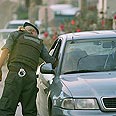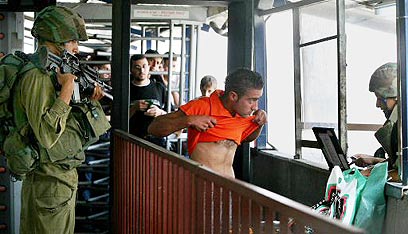

Defense Minister Amir Peretz, who led the plan, made it clear in the past few days that there was not conflict of interests between the IDF's war on terror and the desire to improve the civilian population's quality of life.
Easing restrictions on the Palestinians was one of the issues discussed in Prime Minister Ehud Olmert's meeting with Palestinian President Mahmoud Abbas about a week ago, and civilians will start feeling the outcomes of the meeting Monday.
With dawn, the IDF is expected to conduct samples security checks at 16 checkpoints across the West Bank – checkpoints located in central areas which Palestinian civilians move through.
The security checks in these places will be faster, in order to avoid the sights of long lines forcing civilians to wait for hours and hours.

Checkpoint near Nablus. IDF fears terror attacks (Photo: Reuters)
A change is also expected in the transportation of goods. In several checkpoints, Palestinians will be able to transfer goods using forklifts, a method which will save a lot of time.
As part of the plan's second stage, which may come into force within a few weeks and will be subject to a security evaluation of the situation, the ease of restrictions will be expanded and the siege over Nablus may even be partly removed.
The plan has a third stage, which includes an additional ease of restrictions, but the date for its implementation has yet to be set.
Good news alongside potential danger
The defense establishment has been working on the relief plan for the Palestinians for a long time, with Peretz eventually approving a plan which includes different aspects. Following Olmert's meeting with Abbas, the prime minister held a discussion on the issue, during which it was decided to launch the plan in stages, while conducting security evaluations of the situation.
Peretz, one of the plan's supporters and leaders, stated that each step would be taken while weighing the security ramifications. IDF officials admitted that the plan bears good news for the Palestinian population, both in terms of goods and in terms of the movement across the West Bank, but that it also conceals dangers, mainly on the part of terror elements which may take advantage of the ease of restrictions in order to carry out terror attacks.
In discussions held on the issue, senior Central Command officials expressed their reservations over the relief plan due to these fears, particularly in light of past experience both in the West Bank and in the Gaza Strip, when terrorists carried out attacks by taking advantage of ease of restrictions in crossings.
In any case, the IDF is not expected to reduce its forces stationed at the crossings.
"This is a period in which we will be on high alert, and each unusual incident will of course lead to a renewed examination of the issue," a source clarified. "The intelligence aspect will have an important part in the prevention of terror attacks and any information received will affect what happens."















